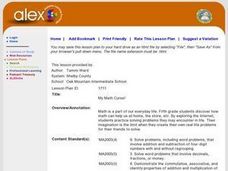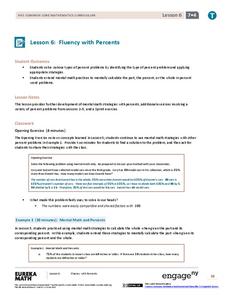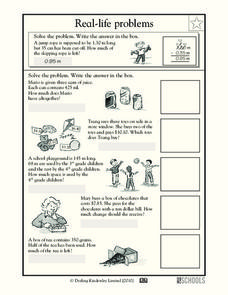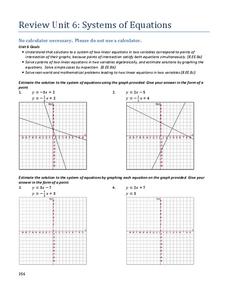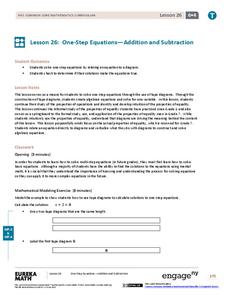Curated OER
Sunshine Math- 1 Venus, III
In this problem solving instructional activity, students complete 7 problems that include: reasoning, basic operations, graphs, tables, geometry and math puzzles.
Curated OER
Sunshine Math- 2 Earth, XIII
In this problem solving worksheet, students complete 7 problems that include skills in probability, addition, even and odd numbers, reasoning and graphs.
Curated OER
Sunshine Math- 5 Saturn, III
In this problem solving worksheet, students complete 8 varied problems that include: money, pictographs, fractions, symmetry and basic operations.
Curated OER
Sunshine Math- 3
In this problem solving worksheet, students complete 8 problems in which real life math applications are used. Included are questions pertaining to number sentences, expanded form, patterns and sequences, perimeter and probability.
Curated OER
Math Word Problems
In this math word problems worksheet, students problem solve by multiplying 1-digit numbers. In this fill in the blank worksheet, students find two products.
Curated OER
My Math Curse!
Math novices examine how math can help them in real-world situations. They listen to the book The Math Curse by Jon Scieszka, solve various word problems from the book, explore various math websites, write original math word problems,...
EngageNY
Solve for Unknown Angles—Angles and Lines at a Point
How do you solve for an unknown angle? In this sixth installment of a 36-part series, young mathematicians use concepts learned in middle school geometry to set up and solve linear equations to find angle measures.
EngageNY
Percent Increase and Decrease
Increase the percent of pupils that are fluent in solving change problems with an activity that asks class members to look at problems that involve either increases or decreases and to express the change in terms of the percent of the...
Noyce Foundation
Rabbit Costumes
How many rabbit costumes can be made? This is the focus question of an activity that requires scholars to use multiplication and division of fractions to solve a real-world problem. They determine the amount of fabric necessary for eight...
Virginia Department of Education
Radical Equations
Provide students with the skill for how to examine algebraic and graphical approaches to solving radical equations. Learners solve various radical equations involving square root and cube root expressions. They first solve using...
EngageNY
Fluency with Percents
Pupils build confidence working with percents as they work several types of percent problems to increase their fluency. The resource contains two sets of problems specifically designed to build efficiency in finding solutions of basic...
Curated OER
Using Groups of Ten to Solve Problems
Upper graders solve math problems involving multiplication using specific strategies. They will use base-ten blocks, hundreds charts, and number lines to solve multiplication problems. Then they will practice several of the strategies...
Curated OER
Subtracting Decimals #3
Practice money and measurement math with a thorough worksheet. Two examples at the top of the page remind fourth graders how to solve subtraction problems using decimals. After working through 14 problems, they then solve two word...
Noyce Foundation
First Rate
Explore distance and time factors to build an understanding of rates. A comprehensive set of problems target learners of all grade levels. The initial problem provides distance and time values and asks for the winner of a race. Another...
Curated OER
Matchstick Math: Using Manipulatives to Model Linear, Quadratic, and Exponential Functions
Playing with matches (unlit, of course) becomes an engaging learning experience in this fun instructional unit. Teach pupils how to apply properties of exponential functions to solve problems. They differentiate between quadratic and...
Curated OER
Real-Life Problems
When did math become so relevant? Scholars choose from four operations to solve five word problems dealing with money and measurements. They show their work in a designated space, and must include units in their answers. Learners work...
Charleston School District
Review Unit 6: Systems of Equations
It's time to show off what they learned! The final lesson in the series is a review worksheet on the topics learned throughout the unit. Scholars solve systems of equations using graphic and algebraic methods, solve system-based word...
Noyce Foundation
On Balance
Investigate the world of unknown quantities with a creative set of five lessons that provides problem situations for varying grade levels. Each problem presents a scenario of fruit with different weights and a balance scale. Using the...
Noyce Foundation
Tri-Triangles
Develop an understanding of algebraic sequences through an exploration of patterns. Five leveled problems target grade levels from elementary through high school. Each problem asks young mathematicians to recognize a geometric pattern....
Curated OER
"Samantha Loves Cookies"
In this math problem solving worksheet, students read a bar graph showing numbers of different kinds of cookies to solve word problems. Students solve 7 problems.
Charleston School District
Pre-Test Unit 6: Systems
As if solving equations with an x isn't tricky enough, now they add a y, too? A pre-assessment gauges the knowledge of your classes related to systems. They are asked to solve graphically and algebraically and to solve word problems.
EngageNY
One-Step Equations—Addition and Subtraction
Just one step is all you need to find success in solving equations. The 27th installment in a series of 36 teaches how to solve one-step equations involving addition and subtraction. Tape diagrams help future mathematicians in this task.
Curated OER
Long Division Methods
This resource provides learners with three different methods for solving long division problems. The same problem is used to show each of the methods, which include guess and check, repeated subtraction, and the classic method. This may...
Willow Tree
Direct and Inverse Variations
Enhance pupil understanding of proportions and variable relationships by studying direct and inverse variation. Use the idea of a proportional relationship to teach direct variation. Then use a similar pattern to help individuals...







